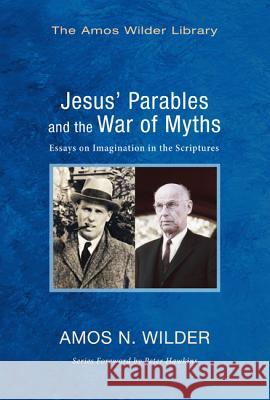Jesus' Parables and the War of Myths: Essays on Imagination in the Scriptures » książka
Jesus' Parables and the War of Myths: Essays on Imagination in the Scriptures
ISBN-13: 9781625643933 / Angielski / Miękka / 2013 / 180 str.
Description: Amos Wilder is widely known as a pioneer of an indigenously North American approach to biblical interpretation which takes language to be an expression not only of psychological but also of sociological and concrete reality. Recording the history of his interest in eschatological language, Wilder further advances the literary and rhetorical criticism of Scripture, especially by alerting interpreters to the deeper modes of language and communication often overlooked. The essays in this volume, recaptured and edited to clarify their relatedness, are presented in two groups. The first group includes essays that situate the parables of Jesus within the broader context of the biblical narrative. The second is a series of essays dealing with the problem of adequately interpreting the ""kingdom language"" of Jesus. The book includes an essay in which Wilder chronicles and advances his long interest in the task of doing justice to the imaginative dimension of biblical language. Wilder develops a contemporary hermeneutic that combines the full range of historical-critical methods with approaches generated by various modern disciplines which attempt to do full justice to the interrelationship of language and reality. The preface by James Breech offers an exposition of the main features of Wilder's hermeneutic, together with a discussion of Wilder's understanding of parabolic narrative and Jesus' symbolics.
Description:Amos Wilder is widely known as a pioneer of an indigenously North American approach to biblical interpretation which takes language to be an expression not only of psychological but also of sociological and concrete reality. Recording the history of his interest in eschatological language, Wilder further advances the literary and rhetorical criticism of Scripture, especially by alerting interpreters to the deeper modes of language and communication often overlooked.The essays in this volume, recaptured and edited to clarify their relatedness, are presented in two groups. The first group includes essays that situate the parables of Jesus within the broader context of the biblical narrative. The second is a series of essays dealing with the problem of adequately interpreting the ""kingdom language"" of Jesus. The book includes an essay in which Wilder chronicles and advances his long interest in the task of doing justice to the imaginative dimension of biblical language. Wilder develops a contemporary hermeneutic that combines the full range of historical-critical methods with approaches generated by various modern disciplines which attempt to do full justice to the interrelationship of language and reality. The preface by James Breech offers an exposition of the main features of Wilders hermeneutic, together with a discussion of Wilders understanding of parabolic narrative and Jesus symbolics.











